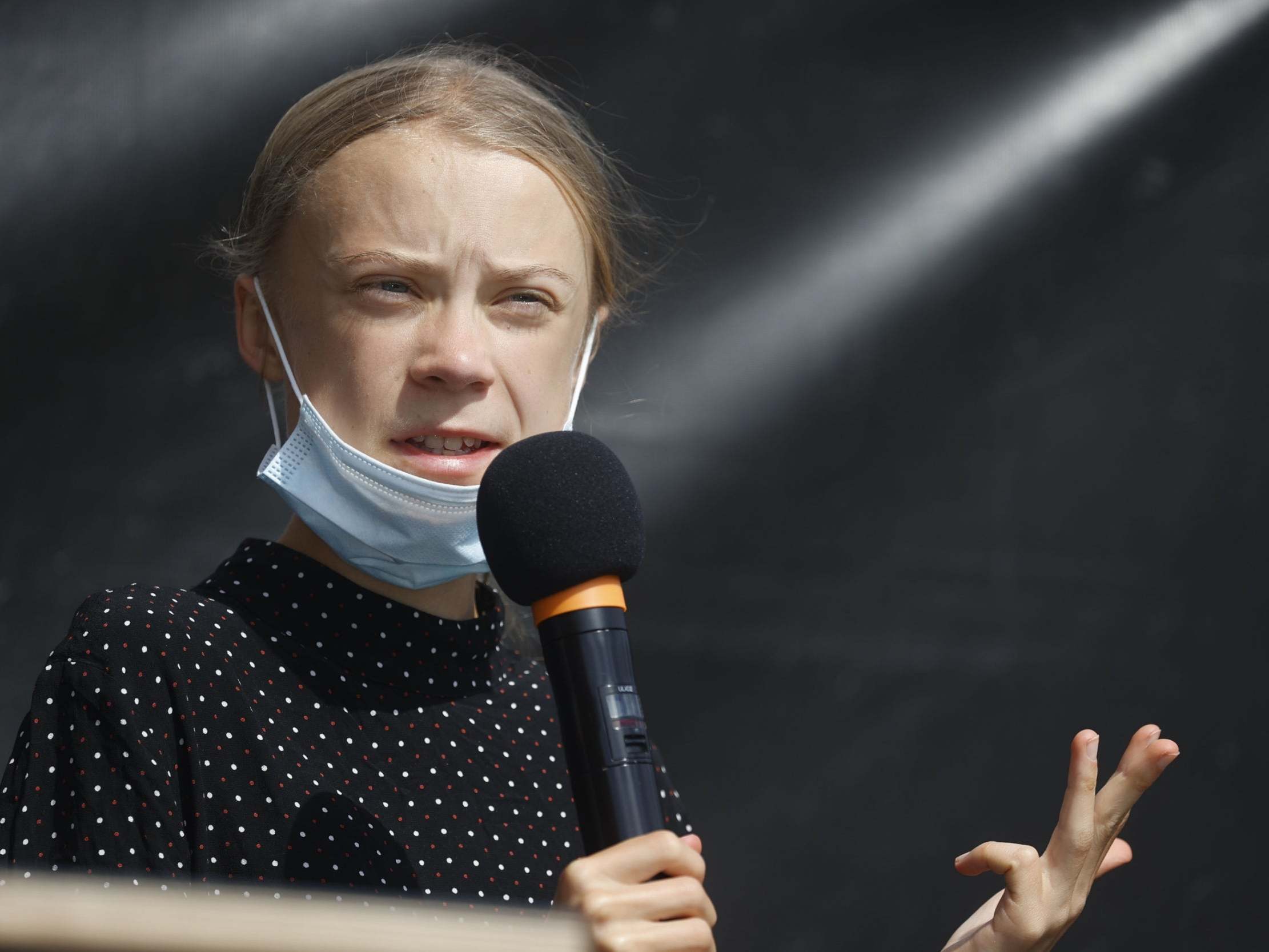This website uses cookies so that we can provide you with the best user experience possible. Cookie information is stored in your browser and performs functions such as recognising you when you return to our website and helping our team to understand which sections of the website you find most interesting and useful.

Leading young climate activists including Greta Thunberg met with Germany's Chancellor Angela Merkel on Thursday to demand tougher action to fight the climate crisis and environmental breakdown.
Two years after the Swedish teenager began her world famous school strike on her own outside the Swedish parliament in Stockholm, she accused world leaders of two years of political inaction.
Ms Thunberg, along with Luisa Neubauer from Germany and Anuna de Wever van der Heyden and Adelaide Charlier, both from Belgium, arrived at the chancellery for a 90-minute meeting, the first high-profile talks the youth activists have held with a world leader since the start of the pandemic.
Arriving at the meeting in Berlin, the activists and their supporters chanted: “We are here, we are loud, because our future's being stolen,” as Ms Thunberg was mobbed by photographers.
The coronavirus outbreak has prevented the Fridays for Future movement Ms Thunberg inspired from holding its mass rallies in recent months.
The activists have repeatedly warned governments around the world are doing too far too little to curb emissions of the greenhouse gases heating up the atmosphere.
In a joint statement published in The Guardian on Wednesday, they accused world leaders of “giving up without even trying” to hit the emissions targets set out in the Paris climate agreement.
“We need to end the ongoing wrecking, exploitation and destruction of our life support systems and move towards a fully decarbonised economy that is centred on the wellbeing of all people, democracy and the natural world,” they said.
And in a letter sent to world leaders last month, Ms Thunberg and other activists called for measures including ending financing for oil and gas projects and setting binding annual carbon budgets.
Created with Sketch.
Created with Sketch.
1/12
In the protest that started a movement, Greta skips school to sit outside of the Swedish parliament in Stockholm in order to raise awareness of climate change on 28 August 2018
Getty
2/12
Greta speaks at the World Economic Forum in Davos on 25 January
AFP/Getty
3/12
Greta stages a protest at the World Economic Forum in Davos on 25 January
Reuters
4/12
Greta speaks at the House of Commons in London on 23 April
PA
5/12
Greta addresses to the occupation at Marble Arch in London on 21 April
AFP/Getty
6/12
Greta meets the pope on a visit to Rome
Reuters
7/12
Greta speaks at the senate in Rome on 18 April
Reuters
8/12
Greta addresses a debate of the EU Environment, Public Health and Food Safety committee at the European Parliament in Strasbourg on 16 April
AFP/Getty
9/12
Greta receives the Special Climate Protection Award at the German Film and Television awards in Berlin on 30 March
AFP/Getty
10/12
Greta attends a children's climate protest in Berlin on 29 March
AFP/Getty
11/12
Greta addresses a children's climate protest on 1 March in Hamburg
Getty
12/12
Greta attends a meeting for the Civil Society For rEUnaissance at the EU Charlemagne Building in Brussels on 21 February
AFP/Getty
1/12
In the protest that started a movement, Greta skips school to sit outside of the Swedish parliament in Stockholm in order to raise awareness of climate change on 28 August 2018
Getty
2/12
Greta speaks at the World Economic Forum in Davos on 25 January
AFP/Getty
3/12
Greta stages a protest at the World Economic Forum in Davos on 25 January
Reuters
4/12
Greta speaks at the House of Commons in London on 23 April
PA
5/12
Greta addresses to the occupation at Marble Arch in London on 21 April
AFP/Getty
6/12
Greta meets the pope on a visit to Rome
Reuters
7/12
Greta speaks at the senate in Rome on 18 April
Reuters
8/12
Greta addresses a debate of the EU Environment, Public Health and Food Safety committee at the European Parliament in Strasbourg on 16 April
AFP/Getty
9/12
Greta receives the Special Climate Protection Award at the German Film and Television awards in Berlin on 30 March
AFP/Getty
10/12
Greta attends a children's climate protest in Berlin on 29 March
AFP/Getty
11/12
Greta addresses a children's climate protest on 1 March in Hamburg
Getty
12/12
Greta attends a meeting for the Civil Society For rEUnaissance at the EU Charlemagne Building in Brussels on 21 February
AFP/Getty
Ms Merkel's spokeswoman Ulrike Demmer said the German government recently agreed to to cut emissions by up to 55 per cent over the coming decade compared with 1990 levels.
It also backs plans for an EU Green Deal and for making Europe the first “climate neutral” continent by 2050.
“The subject [of climate change] is an issue of central importance for the entire German government,” Ms Demmer said.
“As such, an exchange with [the activists] is certainly beneficial.”
Germany currently holds the six-month rotating presidency of the European Union. Ms Merkel has in the past lauded the youth activists for putting pressure on politicians to act against global warming.
Additional reporting by agencies



 Africana55 Radio
Africana55 Radio 

